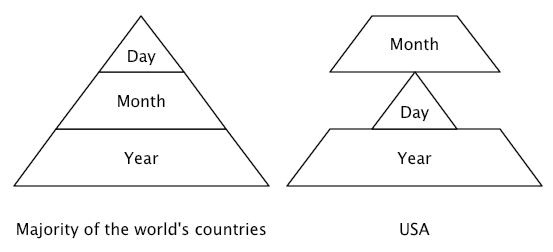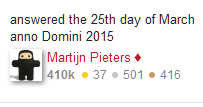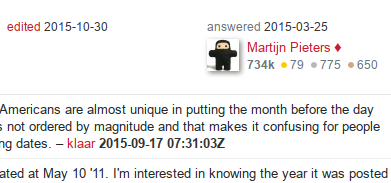I start on the basis that time information is essential to a computer science-related discussion, since the way to solve an issue in this domains changes completely at high frequency (each couple of years there are new technologies that solves the same original issues). For that reason, dates are the third information I read after the question's title and content.
As discussed in this StackExchange post, Americans are used to read the Anglo-Saxon date format (e.g. Dec 15 '14 or May 10 '11) because it is the way we speak in English (American or British).
People from other countries that just read and write English but don't speak it frequently, just like me, can find this format ambiguous. As an example, I am not able to say if May 10 means the 10th of May or May 2010, since in French we commonly use the format June 44 to represent June 1944 or 31/12 for December 31th (the common rule is always smaller to bigger).
There is a famous and funny picture for that:

Why not moving to a ISO 8601-like formatted date time? E.g. 1977/04/22 01:00
Or even better: to a customizable format in the Edit Profile page?
EDIT:
As anwsered by @Martijn Pieters:
hover over any timestamp, you get the full ISO 8601 formatted timestamp already
That is not really efficient to hover over every timestamps while browsing StackOverflow.
Stack Exchange deliberately keeps the number of configuration options to a bare minimum
This bare minimum is a bit subjective. Wouldn't that apply to this minimum?



1977/04/22 01:00is not ISO 8601 compliant. Date separators must be hyphens-E.g.1977-04-22 01:00is good.Mar 15 '16.